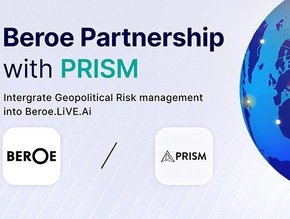The transformational role of Master Data & Thinking

Things fall apart – that’s the law of entropy; it’s woven into the very fabric that makes everything up. In 1958, Chinua Achebe entitled his debut novel, now a classic, with the phrase.
It’s always been a serendipitous paradox that, as physics slouches towards disorder, it simultaneously throws up systems that organise in the most sophisticated ways, and procurement and supply chains are a striking example of these optimising processes.
Think of it, the world falls into disarray through pandemic, war – unwanted and unforeseeable vicissitudes – and procurement and supply chains rearrange their operations like mycelium reconfiguring their roots around collapsing structures, and, somehow, they find a way.
It’s late March, and to get at this ‘somehow’, I’m at IvaluaNow EMEA in Paris, where procurement and supply chain leaders from across the region have gathered to understand how to digitally transform their organisations in such tumultuous times.
As the brightly fuschia-lit stage booms its bass at the attendees, Karolina Hagberg Chinell, CPO of Ahlsell, steps out and announces that she’s going to share Ahlsell’s transformation journey with the audience. She establishes that a key element of it revolves around how they engage closely with their suppliers – one of their core stakeholders alongside their customers and employees – and how they have used digitalisation to do so. But this is just a small piece of the puzzle.
Ahlsell is, as Chinell reveals, strongly committed to building a more sustainable society: “That is our mission and also our reason to be.”
In terms of the company itself, they are the leading distributor of technical installation products, tools, and supplies to industry, installers, energy companies, and the public sector throughout the Nordics. These are all important branches of society, as well as of business.
Ahlsell has a turnover of approximately 50bn SEC (which is equivalent to about €5.5bn), and approximately 7,500 employees and 300 branches throughout the Nordics – “and we're also present with an omnichannel approach to business-to-business, business-to-consumer, and do-it-yourself,” she says.
Just a few more figures: Ahlsell offers more than 1.5mn SKUs to their 250,000-plus customers, coming from more than 10,000 suppliers. 30% of all orders are placed on the web, and so it's a strongly digital company.
Ahsell's digital ourney: Setting out
Chinell reiterates a well-known theme: during COVID, everyone worked in an environment where prices were skyrocketing alongside increasing supply shortages, difficulties in transportation and so on, and that this undeniably increased the focus on creating strong supplier relationships and risk management across industries.
Everyone wanted to create strong partnerships with suppliers. “They wanted to tie them up. They were looking for secondary sources of supply, and they were doing all this during a period where you could not actually meet or travel with new suppliers.
“Therefore, you needed to use ‘digitalisation’,” Chinell emphasises, “and this is also something that is demonstrated in research.”
PWCs survey reveals pressing need for Digitalisation & Ahlsell’s discoveries
If you look at the procurement survey run globally among 800 respondents last year by PWC, it showed that besides cost reduction, digitalisation was of increasing importance, and came in as the third most important strategic priority for procurement departments.
“And this will not be less important in the future,” she says. “At Ahlsell we had been very manual, especially in the source-to-contract part of the procurement process. So, when I joined the company pre-COVID (approximately four-and-a-half years ago), I was convinced that we need to start to digitalise our procurement organisation to be attractive towards our suppliers and invest in our supplier relationships the way that we’re investing in our customer relations. It's crucial that we can communicate, embrace, and relate to our top suppliers.
“Equally important is the internal perspective. Things are changing all the time so we need to increase speed, efficiency, and accuracy to simply create better business – and digitalisation is definitely a measure to do so,” she says. “And I'm convinced – and I'm sure you'll agree – that digitalisation has not only revolutionised your personal life, but also your working life.”
Chinell thinks that it's crucial to understand your stakeholders. To gain more of a perspective on this, Ahlsell began with a survey into their suppliers and employees, and asked: 'What do you want more of?', 'What can we do differently?', 'How can we digitalise to make it easier for you to do business with us – or make it easier for you to do your job within Ahlsell?'
Employee demand for better product data
The survey revealed that internal employees wanted better product data. According to Chinell, good product data is extremely important to execute good business, as well as crucial to being able to digitalise. She says that, since it was also an ongoing project in the company, their employees were already aware of it.
“That can also symbolise that it could be hard to imagine what digitalisation can actually do for you. It's easy to answer in terms of what you already see.”
This is another important point. To risk a metaphor, those born blind don’t know – and can’t really know – what they are missing in the world of sight. Digitalisation may be the light.
Supplier demand for nothing? Digging deeper
The survey results into supplier demand served as a major catalyst for Ahlsell’s next move. They said that everything worked perfectly fine, and they didn't want anything new from Ahlsell.
“And, of course, I was not satisfied with that,” says Chinell. This outcome induced an understanding of what they really wanted “beyond the outspokenly expressed”.
“So it triggered us to be more supplier-centric, and that's how we try to work nowadays. That's my mission within the company. I'm always the one taking the interest of the supplier into account because we have so many others doing it for the customer. And since we buy and sell products, suppliers are absolutely crucial for us.
Creating the first digital roadmap: Strong supplier relationships at core
Based on the findings of their survey, Ahlsell created their first digital roadmap – which determined that strong supplier relationships would be at their core – and decided to approach them in the same way that their customer relationships were approached. "And the reason for that is, of course, that for suppliers, the routes to market are infinite.
"We as Ahlsell simply need to be easier to work with: less costly; better at driving their revenue; and better at reinforcing their brand values to make sure that they choose us as their primary collaborative partner. And, once again, digitalisation is the way to achieve this.”
Based on the survey, Ahlsell clearly defined their needs.
Chinell says: “We put together an RFI and RFQ, went out to scan the supply landscape, and executed a tender to find the best service solution provider for our needs.”
The keys to process optimisation: From master data to supplier onboarding
Chinell says that the first area that they looked into to achieve these objectives was master data to allow Ahlsell to have a more automised onboarding and maintenance of products with increased automisation; with automatic integration of different data pools, industry databases and so on.
Secondly, they looked into supplier negotiations, which is all about Ahlsell's approach to strengthening supplier relationships. Then they looked at traditional contract management and risk management – “both increasingly important”, according to Chinell.
“So we digitalised all the self-assessments that we would traditionally send out to our suppliers manually. We also looked into traditional supplier relationship management (SRM), and that is actually the main driver to get the supplier into our portal because it's about what's in it for them. Through the SRM module, we can actually exchange information and data. Suppliers are able to look at their sales figures or at their delivery positions whenever they want.”
The last area that Ahlsell looked into was supplier onboarding, so that they could have all the financial and sustainability checks automised.
“And all this functionality was not necessarily provided by one supplier, but could be different suppliers behind the scenes. The key for us was that it should all be accessible via the portal with a single sign on,” she says.
Change management: Changing thinking, changing feeling
Concluding, Chinell says: “And lastly, you need to work with change management. Everything is about change. You need to prepare, communicate, and repeat. It's not enough to create awareness; you need to create desire.
“And, once you're created awareness and desire, you need to make sure that there is the knowledge and ability to actually embrace these new technologies. Digitalisation is a transformative journey. It demands a lot of energy and it can be fun, but it’s also challenging.
“It demands that you are swapping back and forth between your logical left-brain and your creative right-brain. Procurement specialists love the left-brain because they're noticed based on the logical skills concerned with numbers, structure, order, and so on.
“But,” she says, “you need to be able to swap between the logical left side and the more creative right side of your brain to really solve problems, to rethink, and to do new things – because digitalisation is about changing the way you do things, which means changing the way you think about things.”






